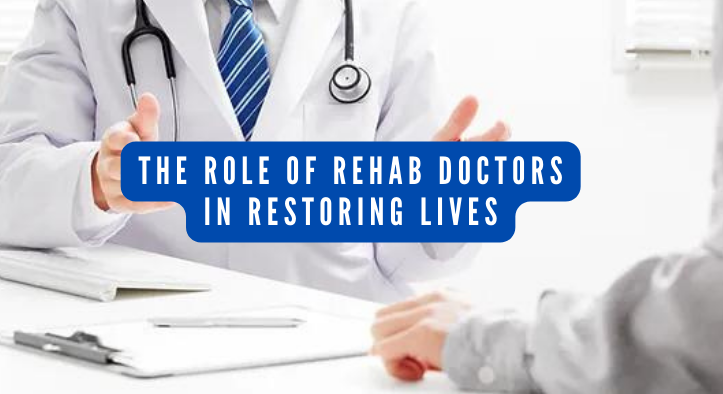The Role of Rehab Doctors in Restoring Lives: A Comprehensive Overview

Exploring the Vital Duties and Expertise of Rehabilitation Physicians
Rehabilitation medicine, often referred to as physical medicine and rehabilitation (PM&R), is a medical specialty that focuses on restoring and improving the functional abilities and quality of life of individuals who have been affected by a wide range of injuries, illnesses, or disabilities. At the core of this specialty are rehabilitation doctors, also known as physiatrists, who play a crucial role in the multidisciplinary approach to patient care. In this article, we will provide a comprehensive overview of the vital duties and expertise of rehabilitation physicians, shedding light on their significant contributions to the restoration of lives.
1. Definition and Training of Rehabilitation Doctors:
Rehabilitation doctors, or physiatrists, are medical doctors who specialize in the field of physical medicine and rehabilitation. They are experts in diagnosing, managing, and treating a diverse range of conditions that affect the musculoskeletal, neurological, cardiovascular, and respiratory systems. Physiatrists undergo extensive training, typically completing a four-year residency program after obtaining their medical degree. During this residency, they gain comprehensive knowledge and skills in various areas, including musculoskeletal medicine, electrodiagnostics, pain management, neurorehabilitation, and pediatric rehabilitation.
2. Comprehensive Assessment and Diagnosis:
One of the primary roles of rehabilitation doctors is to conduct a thorough assessment and diagnosis of their patients. They employ a holistic approach, considering not only the specific condition or injury but also the impact it has on the individual’s overall functioning and well-being. By evaluating a patient’s medical history, performing physical examinations, and utilizing specialized diagnostic tools, such as electromyography (EMG) or nerve conduction studies (NCS), rehabilitation physicians are able to accurately diagnose the underlying causes of functional impairments.
3. Treatment Planning and Coordination:
Based on their comprehensive assessment, rehabilitation doctors develop personalized treatment plans tailored to each patient’s unique needs. These plans often involve a combination of non-surgical interventions, therapeutic exercises, medications, assistive devices, and adaptive strategies. Rehabilitation physicians collaborate closely with a multidisciplinary team of healthcare professionals, including physical therapists, occupational therapists, speech-language pathologists, psychologists, and social workers, to ensure coordinated and comprehensive care.
4. Pain Management:
Chronic pain is a prevalent issue among individuals with disabilities or chronic conditions. Rehabilitation doctors are well-versed in various techniques for managing pain and improving the quality of life for their patients. They employ a multimodal approach that may involve medications, interventional procedures, physical therapy modalities, psychological interventions, and complementary therapies. By addressing pain effectively, rehabilitation physicians aim to enhance functional abilities, reduce reliance on pain medications, and improve overall well-being.
5. Rehabilitation and Functional Restoration:
Rehabilitation physicians are dedicated to restoring and maximizing their patients’ functional abilities. They prescribe targeted exercises and therapies to improve strength, flexibility, endurance, coordination, balance, and mobility. Through physical therapy, occupational therapy, and specialized rehabilitation programs, physiatrists guide patients through a comprehensive rehabilitation process, helping them regain independence, adapt to new circumstances, and reintegrate into their communities.
6. Management of Neurological Conditions:
Neurological conditions, such as stroke, spinal cord injury, traumatic brain injury, and multiple sclerosis, often result in significant functional impairments. Rehabilitation doctors specialize in managing these conditions, employing evidence-based strategies to optimize recovery and enhance neurological function. They address spasticity, gait abnormalities, muscle weakness, coordination difficulties, and cognitive challenges through a combination of pharmacological interventions, neurorehabilitation techniques, and assistive technologies.
7. Collaboration and Advocacy:
Rehabilitation physicians play an essential role in advocating for their patients’ needs and promoting accessibility and inclusivity. They collaborate with various stakeholders, including patients, families, caregivers, and community resources, to ensure a comprehensive support network. By addressing barriers to participation and actively engaging in community outreach, rehabilitation doctors strive to improve the overall quality of life for individuals with disabilities.
Rehabilitation doctors, or physiatrists, are integral members of the healthcare team, specializing in the restoration and improvement of functional abilities for individuals with injuries, illnesses, or disabilities. Through comprehensive assessment, personalized treatment planning, pain management, and rehabilitation strategies, they guide patients on a journey of recovery and restoration. With their expertise and dedication, rehabilitation physicians help restore lives and empower individuals to achieve their highest level of independence and quality of life.
